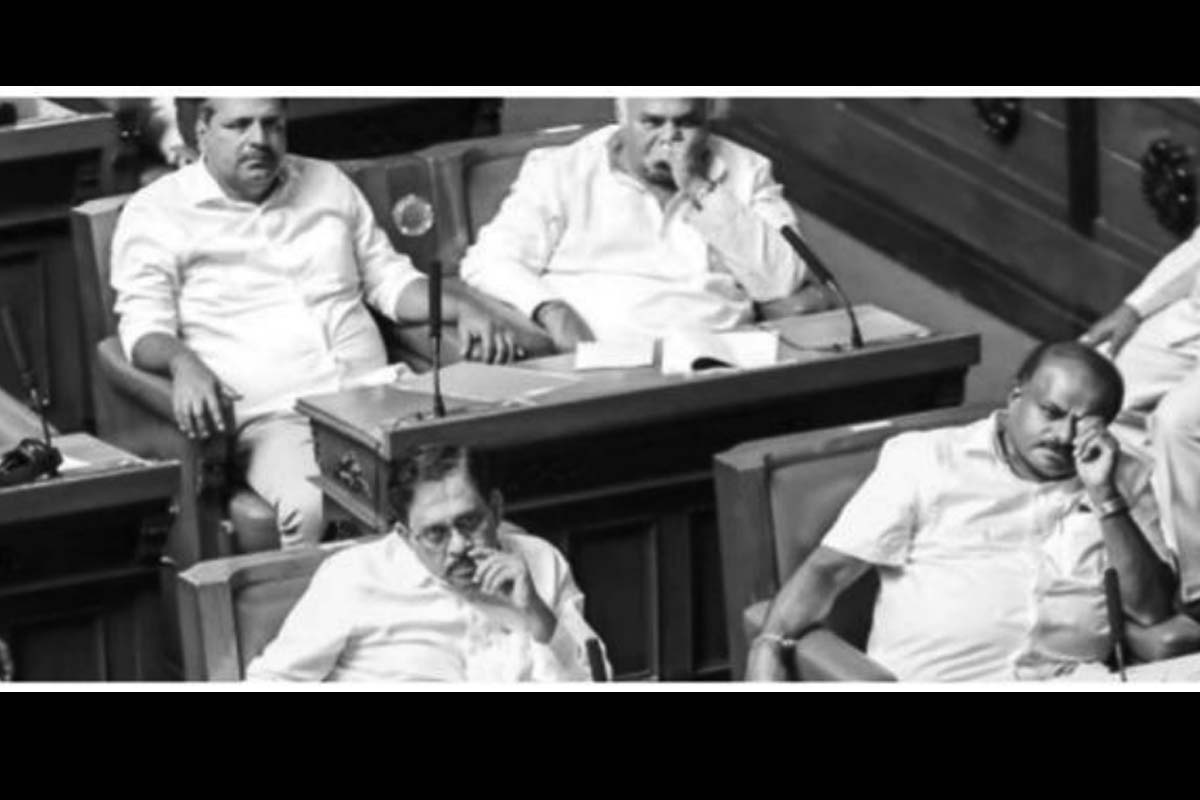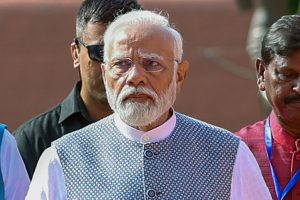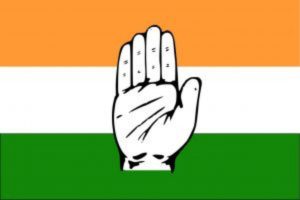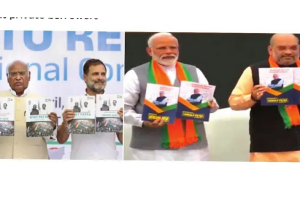Amorality is the defining characteristic of our times. Addiction to computers and an exaggerated love for technology have made human beings imbibe impersonal robotic qualities. Add to it individualism and consumerism and we have a population that works only for their own benefit and pleasure even if such benefit or pleasure can be had only at a cost to the society at large.
Consequently, we have bankers who swindle banks, teachers who play hookey in school but teach in coaching classes, students who do not study but copy in exams, sportsmen who do not practise enough but take drugs to enhance their performance, bureaucrats and politicians who sell the country down the river and so on. No person or class of persons feels the slightest compunction in deviating from the straight and narrow path if they feel that they have a fair chance of escaping the consequences of their actions.
We had large-scale scams where the leaders of society, without any feeling of remorse or repentance, defrauded the public that had reposed faith in them. Earlier, even an accusation of corruption would have made a political leader withdraw from public life and the electorate would not have countenanced a leader against whom a credible charge of corruption had been made. Today, TV News shows politicians accused of corruption entering the courtroom triumphantly… as if they were going for the Bharat Ratna investiture ceremony. The accused in the 2G scam ensured that the press was present when they emerged from jail, to a thunderous welcome from their supporters.
Officials entrusted with administrative and policing duties look up to their political masters before taking any significant step. A regime change means that the crimes of people of the previous dispensation are thoroughly investigated. No one asks the investigating agencies why were they not vigilant when the crimes in question were being committed.
Such behaviour of errant politicians and bureaucrats, though condemnable, would not have been a cause of concern, if repeated episodes of mis-governance, had not inured the public to corruption and worse. The fact that 33 per cent MPs of the Seventeenth Lok Sabha have criminal cases pending against them and assets of politicians multiply manifold after they get political office, bears out the truth of this assertion. If an apolitical person asks voters as to why they elect tainted persons he would be met with some inane response like “Everyone is like that.” The bottom-line is that the electorate votes on caste and communal lines with the understanding that the lawmaker would help them in case of necessity.
The Anti-Defection law was enacted to prevent horse-trading of legislators ~ doubtless a defamatory statement so far as horses are concerned ~ the law prescribing disqualification should be less than two-third of the legislators of a party defect. We are now witnessing the strange phenomenon of more than two-third legislators and in some cases all legislators of a party crossing over to the ruling party. For example, all six MLAs of the BSP joined the Congress in Rajasthan. The Sikkim Democratic Front (SDF) won 13 out of the 32 seats in the Assembly elections held in May 2019 and the Bharatiya Janata Party (BJP) drew a blank. Recently, 10 SDF MLAs joined the BJP making it the principal opposition party in the state. Similarly, 12 out of 18 Congress MLAs joined the TRS in Telangana and 10 out of 15 Congress MLAs joined the BJP in Goa. If the stakes are high enough, individual legislators resign both from the legislature and their party. The real tragedy is that more often than not such turncoats are re-elected by the electorate, emboldening prospective defectors.
Given the pronounced difference between the ideologies of different political parties, a normal person would not feel comfortable in switching over to a new party only because the present electoral prospects of his original party were not good. Yet we have had legions of party hoppers. Some enterprising ones return to their old party when its stars improve, justifying their actions as ghar wapsi (homecoming). It is the voters who are defrauded because their representatives support some ideology that the voters had rejected. Moreover, the same persons end up in the Government regardless of the party that had won the elections, making a mockery of the very concept of democracy. Political defections have a long history. One of the earliest party-hoppers was Winston Churchill, who was elected as an MP on a Conservative Party ticket in 1900 but switched over to the Liberal Party in 1904, where he remained till 1924. Churchill again crossed over to the Conservative Party in 1924. However, unlike present-day defectors Churchill’s change of loyalties was motivated by ideological conflicts, not by the lure of lucre.
Since Independence, trillions of rupees have been spent on alleviation of poverty and development of infrastructure. The current year’s budget provision under these heads is in excess of Rs.12 lakh crore but we are still not a developed country only because most of the funds meant for development are eaten away. Most Government schemes do not succeed because those in charge of implementation are often corrupt and do not put in sincere efforts for the success of the schemes they are supposed to implement.
The greatest cause of concern in the current scenario is that in most cases, the bureaucrats who keep their hands under the table and the politicians who change parties as frequently as we change clothes, are regular guys who behave normally till they get a whiff of money. It would appear that their moral compass has gone awry; they have no sense of right or wrong. Sometimes, the Government punishes its corrupt employees by changing their job description but in nine cases out of ten, their replacements turn out to be equally bad.
The never-ending list of loan scandals where funds meant for business were siphoned off for personal aggrandisement demonstrates that the private sector too has its fair share of black sheep. The fact that a string of religious leaders are under investigation for heinous crimes like rape would show that religion and morality do not necessarily converge. Amorality, the root cause of many present-day problems, is common to all classes of society; demonetisation failed because the poor actively connived in tax evasion by letting the rich park their money in their Jan Dhan accounts, bank officers facilitated money laundering in various ingenious ways and shopkeepers issued pre-dated receipts to mask tax evasion. One can say that the present system is designed to deter some deviant persons; the system has failed because the overwhelming majority do not follow the rules.
Our reputation as a dodgy people who would even steal soap and towels from their hotel rooms precedes us wherever we go. We are a poor people no longer, at least not the ones who stay in five-star hotels, but lack of moral values makes us behave dishonestly. In our own country, we feel pride in cutting corners; people who successfully circumvent the law of the land are not ostracised but looked upon with respect. As citizens of an emerging superpower, we should realise that we need to be good and honest citizens to make our country great because a country is only as good as its citizens. Unfortunately, for us, the converse is also true. The political scientist Prof RN Gilchrist observed: “The state is founded on the minds of its citizens, who are moral agents… a bad people mean a bad state and bad laws.”
At a time when we have all but forgotten the Mahatma, his idea of inculcating morality in ourselves can transform India into a great country, if not a $5 trillion economy. The Civil Services Examination has a compulsory paper “Ethics” to make budding civil servants aware of morality but it is a case of too little and too late. Good morals can become a part of one’s personality only if taught in childhood. Sadly, moral instruction has been crowded out of the pre-primary and primary school syllabus by other more ‘relevant’ subjects. First graders of today are more likely to know the capital of Iceland rather than the story of Raja Harishchandra.
Recently, various States have decreed that failure in fifth and eight class would entail repeating the same class. This is a retrograde step. The examinations being crucial and the quality of instruction in most schools being below par, this would only result in children learning to cheat at an early age. Otherwise also, instead of making young children memorise bulky texts we have to teach them how to become good and honest citizens.
More than a century ago, President Theodore Roosevelt had said: “To educate a man in mind and not in morals is to educate a menace to society.” It is time that we realised the truth of his warning.
(The writer is a retired Principal Chief Commissioner of Income-Tax)











